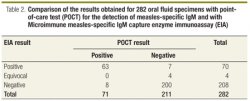Rubeola virus AB IgG negative
An IgG antibody test for measles or mumps may be ordered whenever a health practitioner wants to determine whether a person is immune to one or both of the viruses, either because of a previous infection or due to vaccination.
Measles or mumps and IgG antibody tests, viral, or PCR may be ordered when a person has characteristic and of measles or mups or has had exposure to someone with the virus and now has a fever and some symptoms that could be due to measles or mumps. These tests are typically ordered early in the course of the infection.
Signs and symptoms of measles develop 7-18 days after exposure and usually include one or more of the following:
- A characteristic rash that usually starts on the face and spreads down the body to the trunk and legs
- High fever
- Dry cough
- Red, watery, itchy eyes
- Sensitivity to light
- A runny nose
- Sore throat
- Tiny white spots inside the mouth
Signs and symptoms of mumps typically develop after a 2 to 3 week incubation period and often resemble symptoms of the flu, such as:
- Headache
- Muscle aches
- Fever
- These are followed by characteristic swelling of the salivary glands below one or both ears called parotitis.
Testing may also be ordered during a suspected or confirmed outbreak, when several people may have been exposed and have the signs and symptoms listed above.
What does the test result mean?
Antibody testing
When measles or mumps antibodies are present in someone who has not been recently vaccinated, then it is likely that the person has a current measles or mumps infection. When both IgM and antibodies are present or there is a fourfold increase in concentrations between and IgG antibody tests, then it is likely that the person has a current or had a recent measles or mumps infection.







